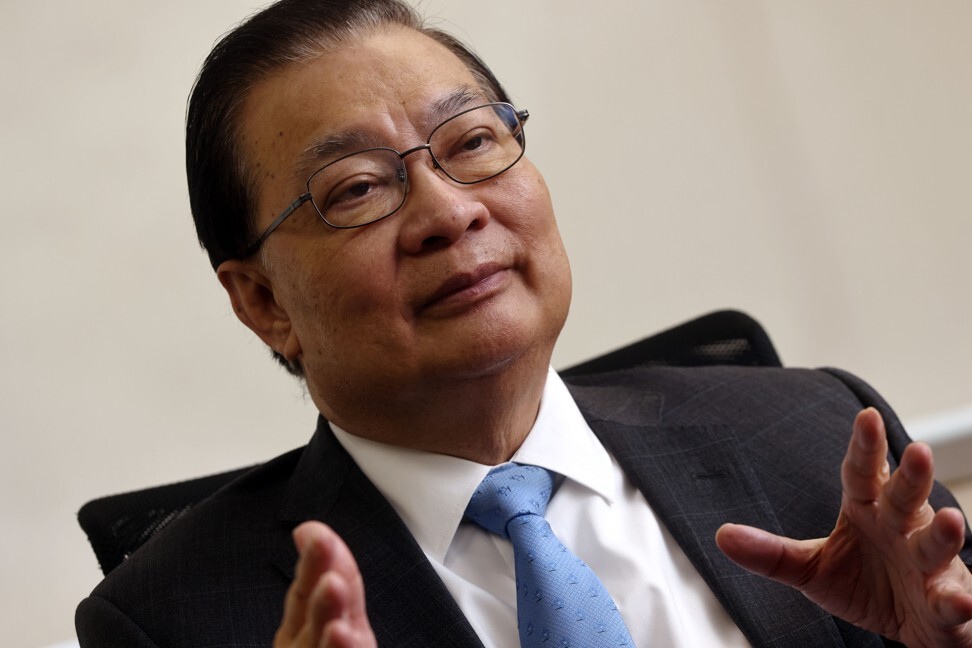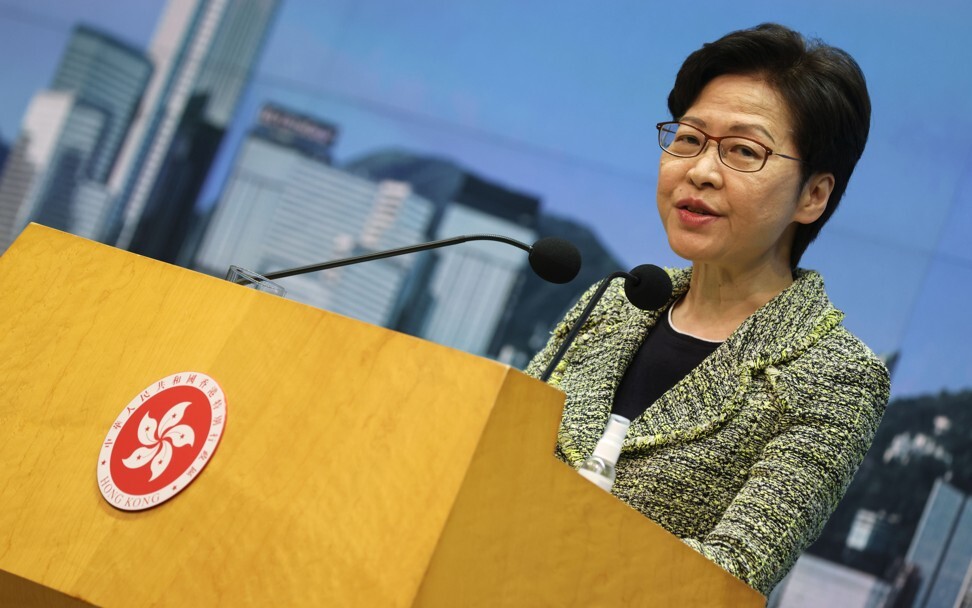
Hong Kong ‘must act with urgency’ on sanctions defences when Beijing approves new law for the city this week
- Tam Yiu-chung, sole Hong Kong delegate to China’s top legislative body, says city should work closely with Beijing on developing its own defence system against foreign sanctions
- Hong Kong leader says implementing the legislation before Legco term ends in October will be challenging, with new session not opening until early next year
Hong Kong must start developing its own defence system against foreign sanctions in coordination with the central government when China’s top legislative body approves a new law for the city on Friday, according to a senior pro-Beijing politician.
The National People’s Congress (NPC) Standing Committee on Tuesday declared the legislative process in Hong Kong a matter of urgency for local officials, but stopped short of setting a deadline for completion, added Tam Yiu-chung, the city’s sole delegate to the body.
China’s anti-sanctions law ‘can target individuals, families, organisations’
“The committee will make the decision on Friday,” Tam said, referring to Beijing’s anti-sanctions law that will apply in the city.
“The Hong Kong government will then need to set up the system and mechanism for countering foreign sanctions, and follow up on how to do it.”
However, she said there was not much time to make progress with the current Legislative Council term ending in October.
“It will be an extremely tight timetable to rush a piece of legislation with the necessary consultation with stakeholders within this term,” she said. “But that is, of course, my opinion at the moment because I cannot pre-empt the NPC Standing Committee.”
Analysts said that, under a local legislative process, authorities would need at least a few months to consult stakeholders and draft legislation. Lawmakers would also require at least several weeks to scrutinise the bill in detail, before putting it to a vote.

Since it was revealed last month that the anti-foreign sanctions law would take effect in Hong Kong, pro-Beijing figures had argued the legislation could be directly promulgated in the city.
They said it could be time-consuming for Hong Kong officials and lawmakers to make their own adjustments, but Lam and Financial Secretary Paul Chan Mo-po countered that a local legislative process was necessary for maintaining the city’s reputation as a global commerce hub.
Anti-sanctions law: can Hong Kong banks stay in good graces of China, US?
The broad legislation empowers Chinese authorities to seize assets from entities that implement sanctions against the country and allows individuals and companies to seek compensation for discriminatory practices in local courts. Businesses can be held liable if they refuse to help Beijing carry out countermeasures.
Beijing drafted the legislation in response to a spate of punitive measures imposed by the United States on mainland Chinese and Hong Kong officials accused of eroding the city’s freedoms.

Speaking after the NPC Standing Committee completed its first of four days of meetings on a series of draft laws, Tam said he hoped the anti-sanctions legislation would stop foreign powers taking punitive action against Chinese and Hong Kong officials.
“The US has the sanctions law. Our country also made an anti-sanctions law. I think it is very reasonable. We hope that when we have the new weapon, we can stop the other side from resorting to sanctions, otherwise both sides will get hurt,” he added.
‘Ambiguity’ of Hong Kong’s anti-sanctions law will ensure flexibility for banks: insiders
Tam did not comment on how the “system and mechanism” should be established.
Pro-business lawmaker Felix Chung Kwok-pan, leader of the Liberal Party, said he believed the city’s finance, justice and commerce ministers should play an active role in developing the mechanism to ensure the retaliatory measures would not hinder Hong Kong’s global reputation.
“We might not need another committee to enforce this law, but the financial secretary needs to be involved because a lot of people are worried whether Hong Kong’s financial industry would be affected by the new law,” he said.
“I hope that we can have at least a few months or half a year to consult stakeholders and draft the legislation.”

02:23
China passes anti-sanctions law to counter punitive action by foreign countries
Import and export sector lawmaker Wong Ting-kwong said those three ministers should also work closely on establishing the system with the city’s security chief and the Chinese foreign ministry’s Hong Kong commissioner.
“Countering foreign sanctions is a new area for us because in the past, we only followed the UN’s orders in sanctioning certain countries,” Wong said.
“With the mechanism, these officials will be involved in negotiations, as well as visa and other immigration matters of sanctioned individuals.”
Under Article 18 of Hong Kong’s Basic Law, state legislation does not apply in the city except for those listed in Annex III. Once included, they can then take effect locally either by promulgation or through the city’s Legislative Council.
Lam suggested earlier that the law should be applied to Hong Kong via local legislation to prevent the issue from being “hyped up” by foreign forces looking to weaken the city’s status as a financial centre.
Lam on Tuesday said her administration had opened initial talks on how the law should look, citing previous local legislation to implement central government decisions on UN sanctions.
“It is not an entirely alien area such that we do not know how to draft the law,” she said, referring to the United Nations Sanctions Ordinance and its subsidiary regulations, enacted in the city to implement resolutions of the Security Council of the UN against respective countries. The legislation ensures trade and activities with such sanctioned countries are subject to certain restrictions.
China’s move to impose anti-sanctions law in Hong Kong ‘will not be immediate’
According to a government source, there were no signs that the matter would be a Legco priority. The polls, postponed for a year because of the coronavirus pandemic, are set for December.
If the government is unable to pass the anti-sanctions law before October, the bill can only return to the discussion table early next year, when the seventh term of Legco begins.
Lam added that her government would improve its communication with business sectors over the local legislative processes.
She cited the implementation of the Beijing-drafted national security law last June as an example, noting initial anxiety among Hong Kong-based business chambers.
“[But] in recent interactions ... I have this very strong feeling that the initial anxiety about the national security law has subsided,” she added.
Additional reporting by Cat Wang



